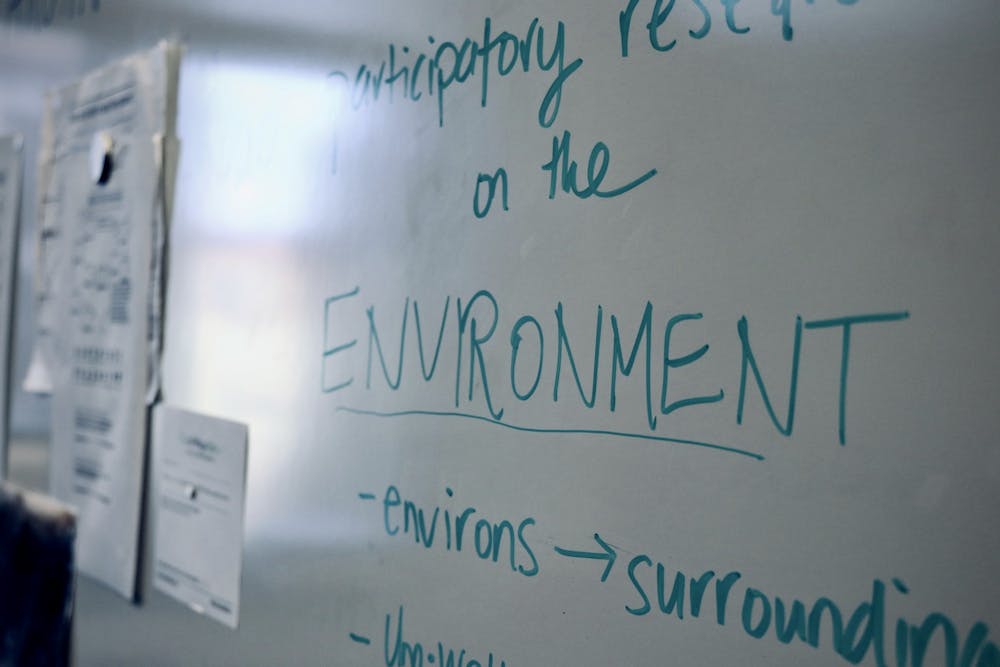The Penn Program in Environmental Humanities kicked off its 2020-2021 academic year webinar series this past week during Climate Week at Penn.
The webinars — which included a mini-lecture on Wednesday and a Climate Storytelling workshop on Thursday — are part of a larger initiative, the My Climate Story campaign. Through the campaign, PPEH aims to identify how to implement climate and ecological literacy within the liberal arts curriculum in Philadelphia schools and beyond.
Wednesday’s mini-lecture focused on the importance of including more climate and ecological literacy in general education curricula. Thursday’s workshop taught faculty and students from across the country about climate storytelling tools that they can use to express their own emotions about and experiences with climate change.
“So many people are sitting alone with these feelings, and the very active coming together and sharing stories is really powerful and a real emotional boost and amazingly restorative, and then can become the basis for more tangible, concrete action on climate,” PPEH Faculty Director and professor of German Bethany Wiggin said.
The My Climate Story campaign is currently led by three research interns: College seniors Connor Scarlett Hardy, Tsemone Ogbemi, and Danny Cooper, who is also an Under the Button staff writer. Hardy and Cooper worked together to design Thursday’s Climate Storytelling workshop, which was held over Zoom.
The workshop’s participants were split between two activities. One half used Hardy’s storytelling framework to write stories about their own experiences with climate change, while the other half wrote how plants and animals are affected by the climate. Cooper incorporated the latter segment based on his project, My Climate Story Beyond Humans, a platform where people can post photos of flora and fauna and share stories about the impact of climate change on these organisms.
Ogbemi, while also involved with the workshops, has primarily headed Imagination Machine, a newsletter that brings hope to those concerned with climate change by spotlighting exciting art, science, and activism projects.
Wiggin founded the My Climate Story initiative last year after she became frustrated with a misconception among the local community that climate change has yet to come to Philadelphia.
RELATED:
New course will explore the ways humans have altered the environment throughout history
Penn's first Energy Week unites researchers in science, environment, and policy
Although human-caused climate change is commonly associated with floods, wildfires, and images of polar bears on shrinking ice caps, Wiggin said she wanted people to realize its direct impact on their own lives. The My Climate Story campaign features a story bank where individuals can submit stories about their own experiences with climate change to help people realize how far-reaching the issue is.
The story bank now contains experiences as told by individuals across 15 languages.
This academic year, PPEH plans to expand their storytelling campaign to reach eighth-graders in Philadelphia schools.
“If you can develop public engagement projects and storytelling ideas that are accessible to eighth-graders, anyone can do them,” Wiggin said. “Based on my work in the past with Philadelphia teachers, there is an enormous hunger for these curricular materials.”
In the future, the campaign will focus on training eighth-grade teachers to become climate storytelling facilitators themselves, providing them with powerpoints, scripts, and other educational materials developed by Hardy so they can then teach climate and eco-literacy in their literature, science, and language classes.
The next Climate Storytelling webinar will take place on Nov. 6, and will be held for the undergraduate fellows of the Wolf Humanities Center. The workshop will explore the intersection of the center’s annual research topic this year — Choice — with climate change, environmental literacy, and the My Climate Story initiative.
The PPEH team has been talking to the Kelly Writers House to collaborate on projects, and are looking to develop connections with any organizations who may be interested in co-hosting workshops.
In addition to the webinars, Penn undergraduates now also have opportunities to explore environmental humanities through the new Environmental Humanities minor being offered in the School of Arts and Sciences.









